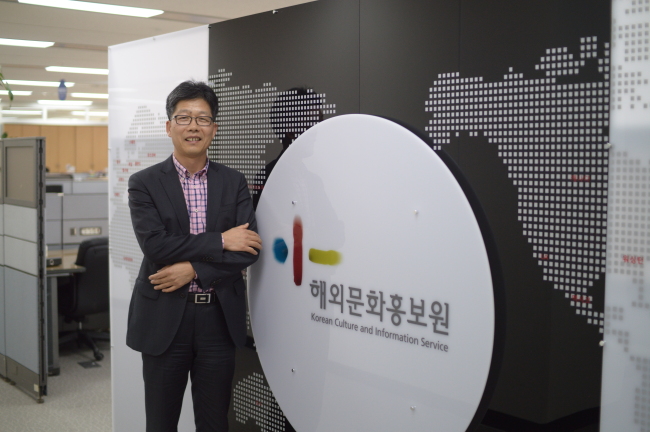Dreaming ‘the ultimate hallyu’
Chief overseas PR man stresses tailored approach to further promoting Korea
Investing in a country’s image abroad can be a costly wager.
While it requires a well-coordinated strategy on various levels and dimensions, an army of skilled and passionate country marketers, and most importantly, sufficient time and money, there is no guarantee of measurable success, given its elusive target: global citizens.
Yet, Won Yong-gi, Korea’s chief PR man, has a clear vision and ideas to realize it.
“In the past, we may have lacked the substance (to show to the world.) But now we have it ― hallyu,” Won said in an interview last week at his office inside the Korean Culture and Information Service in Sejong, an administrative town about 110 kilometers south of Seoul. He became chief of the state-run agency at the end of last year.
 |
|
Won Yong-gi, director of Korean Culture and Information Service, poses at his office in Sejong City. (Lee Sun-young / The Korea Herald) |
Hallyu, or the Korean Wave, refers to the phenomenal popularity of Korean TV dramas, pop music and other cultural products. It started a decade ago in Japan with a series of megahit soap operas. Soon enough, other Asian countries including China, caught up, churning out ardent fans of Korean culture. Now with K-pop at the forefront, hallyu is reaching out to a broader audience in Europe, the Americas and the Middle East.
Won witnessed how hallyu has changed the face of Korea during his three-year stint at the Korea Culture Center in London, one of the KCIS’ 27 missions overseas.
“Before hallyu, Korea was often associated with negative images of the Korean War and confrontations with North Korea, but it boasts a much softer, more cultural image,” he said.
To back his observation, he cited an annual survey of the privately-run Corea Image Communication Institute.
The poll asks foreigners to name the first thing that comes to their mind when they think of Korea. In the latest 2013 survey, hallyu ― K-pop and K-dramas in particular ― came out on top. In 2012, “Samsung and other conglomerates” topped the list, followed by “a divided nation.” In 2011, “a divided nation” came first and “Samsung and conglomerates” second.
Taking the Korean Wave to another level and building it into the country’s soft power is what officials like Won must ponder.
“There is no denying that much of the work has to be done by the private sector. But there is, definitely, a role that the government can and must play,” he said.
But in playing the role, government officials must think outside the propaganda box and try something creative, aggressive and forward-looking.
“One-way communication doesn’t work,” Won said, adding that there is almost always a mismatch between what a country wants to show to the world and what the world wants to know about the country.
“That’s why we need to take a localized and tailored approach.”
Won has first-hand experience to say that with confidence.
For 100 days around the 2012 London Olympics, he orchestrated a Korean cultural festival throughout London, as head of the Korean Culture Center there, which evoked positive responses from Londoners as well as visitors.
Dubbed “All Eyes on Korea” festival, various events showcased Korean culture at major cultural icons of the U.K. capital, including Victoria & Albert Museum and the Southbank Centre.
“What I learned from the experience is that it is very important to involve local people and organizations and incorporate their perspective from the beginning in preparing for such events,” he said. “That way, we could reach out to a broader local audience and attract the attention of local media.”
Now K-dramas and K-pop are two main pillars of Hallyu, but Won sees untapped potential in fashion, character animation and other areas.
“What we, government officials, can and should do is detect signs of interest and provide what could serve as the spark to ignite another wave of Hallyu,” he said.
Interest in Hallyu will eventually lead to interest in Korea itself and its people. People with interest in Korea and its people would naturally want to visit here, try the food and travel the country.
“An ultimate Hallyu is to be found there ― among the Koreans they meet on the streets, at outdoor markets and shops.”
By Lee Sun-young (milaya@heraldcorp.com)